2003 年 9 月公共英语三级考试真题及答案
SECTION
I
Listening
Comprehension(25 minutes)
1~25 略
SECTION Ⅱ Use
of
English(15 minutes)
Directions:
Read the following text. Choose the best word or phrase for each numbered blank
and mark A, B, C, or D on ANSWER SHEET 1.
Text
Music is an important way of expressing people' s feelings and emotions.
The
26
, for instance, from 1960 to 1969 will be
27
by many as a period
of social and political unrest in America.
28
this time, many people
despaired
29
the music favored by the American
teenagers.
30
, we
must now admit that the music they loved was
a
32
of the tensions and changes that were
31
33
a sign of the period
and
American society. In the early
sixties,34
about social justice and equality were
35
by the song “Blowing
in the Wind” which 36
the civil rights song “We Shall Overcome”. The conflict
concerning military
37
in Vietnam was sung about in 1965 in the
38
song
“Eve of Destruction” and in the song “Ballad of the Green Beret”. A few
years
39
, a gradual shift in mood became
40
in one of the most popular
songs which suggested calmer questions and possible answers even as some pop stars
protested loudly
41
the draft. Finally, music as a
42
of the
political and social process in America was highlighted at Woodstock, New York, where
half a million young people came
43 in 1969 to spend three days listening to songs
that spanned the decade. This event was a symbol of the desire for
44
within
a time of unrest. Woodstock was a
45
of hope in days of rage.
26. [ A ] generation
[ B ] age
[ C ]
decade
[ D ] era
27. [ A ] recorded
[ B ] remembered
[ C ]
regretted
[ D ] recommended
�
28. [ A ] For
[ B ] After
[ C ]
During
[ D ] At
29. [ A ] over
[ B ] at
[ C ]
with
[ D ] for
30. [ A ] Moreover
[ B ] However
[ C ]
Therefore
[ D ] Thus
31. [ A ] only
[ B ] occasionally
[ C ]
often
[ D ] never
32. [ A ] reflection
[ B ] reaction
[ C ]
recreation
[ D ] relaxation
33. [ A ] effecting
[ B ] affecting
[ C ]
defecting
[ D ] perfecting
34. [ A ] questions
[ B ] arguments
[ C ]
debates
[ D ] disputes
35. [ A ] dismissed
[ B ] removed
[ C ]
raised
[ D ] promoted
36. [ A ] reformed
[ B ] echoed
[ C ]
repeated
[ D ] respected
37. [ A ] involvement
[ B ] assignment
[ C ]
replacement
[ D ] settlement
38. [ A ] dissatisfying [ B ] delighting
[ C ]
pleasing
[ D ] discouraging
39. [ A ] later
[ B ] past
[ C ]
on
[ D ] ahead
40. [ A ] evident
[ B ] positive
[ C ]
realistic
[ D ] instructive
�
41. [ A ] with
[ B ] against
[ C ]
towards
[ D ] about
42. [ A ] tool
[ B ] creation
[ C ]
mirror
[ D ] decoration
43. [ A ] along
[ B ] up
[ C ]
together
[ D ] out
44. [ A ] unity
[ B ] reality
[ C ]
popularity
[ D ] individuality
45. [ A ] presentation
[ B ] display
[ C ]
performance
[ D ] publication
SECTION Ⅲ Reading Comprehension(40 minutes)
Part A
Directions:
Read the following three texts. Answer the questions on each text by choosing
A, B, C or D. Mark your answers on ANSWER SHEET 1.
Text 1
I'd been living with my wife for eight years and one night “morn” says, “I
guess you guys are never gonna get married. I mean, you've been through jail together,
you' e living together, but.., oh, forget it.”
“Oh, well,” I said, “put it like that and I'll marry your daughter tomorrow.”
Actually, I don't know what we were waiting for, except that for a guy it's never
the right time to get married. I' m also suspicious of any two people who don' t
struggle with that decision. Part of my problem was that I was still lusting in my
heart after other ladies. But somehow I knew that I wasn't going to find another
woman remotely as great as my soon-to-be wife. It's a good thing my mother-in-law
finally spoke up.
I finally gathered my courage one day when we were having a picnic, and popped
the question. I also gave my wife a big tourist pamphlet about Switzerland. I wasn't
taking any chances.
�
She said no.
It killed me. I felt sick to my stomach. I lost my appetite. Our dog just stared
at me, thinking, “If you're not going to eat your lunch, I will.” Finally, I said,
“But the Switzerland trip is yours if you say yes.”
“Switzerland,” she said, “is filled with precise, humorless people.”
“Maybe I should have suggested Paris?”
For a minute it seemed as if my change in travel plans would rate a solid “maybe”.
But she said no again.When we woke up the next morning, she told me that she'd slept
on my proposal. “I guess I was a little rude to you last night,” she explained.
Meanwhile, I' m figuring I' m off the hook for this marriage thing for at least another
eight years. I could afford to be generous.
“I asked, you said no. It's okay,” I said. I might have looked a little too
relieved because later that day she gave me a little box. Inside was a gold watch.
On the back was inscribed. “Yes. I've reconsidered.”
I liked the watch, so I did the right thing.
46. The reason why the man had waited so long was that he_________.
[ A ] didn' t think eight years was long enough
[ B ] suspected that husband and wife would often quarrel
[ C ] didn' t think he was ready to propose to her
[ D ] was waiting for his mother-in-law' s approval
47. The man proposed to the woman because _________.
[ A] he realized he could find no other woman better
[ B ] he was afraid that the woman might leave him
[ C ] he was eager to visit Switzerland with the woman
[ D ] he could finally overcome his fear for marriage
48. By saying “I could afford to be generous.” (third paragraph from the bottom)
the man implied that he__________.
[ A ] wouldn' t care too much if he stayed single
[ B ] could take her to a better place than Paris
[ C ] was rich enough to support his wife
[ D ] didn't care what she thought about his proposal
�
49. The last sentence “I did the right thing” implied he_________.
[ A ] traveled with his wife
[ B ] had a successful marriage
[ C ] liked the watch very much
[ D ] waited for another eight years
50. The best title for this text would be___________.
[ A ] How My Mother-In-Law Helped Me
[ B ] How I Received a Gold Watch I Liked
[ C ] How I Made My Wife Travel With
Me
[ D ] How I Came to Marry-My Wife
Text 2
“Hi there. How's it going?”
“Oh, fine. Fine. How about this weather, huh ?”
“Well, I guess we can always use the rain.”
What's that? This story ? Oh, just a little look at small talk. You know, those
seemingly meaningless conversations you have dozens of times a day, Maybe you' re
waiting for the elevator.
Or in a line at the bank. It all seems pretty trivial. Idle chatter about traffic
doesn' t do much more than fill the air with empty words that are quickly forgotten.
But you should know that small talk actually has a big place in our lives.
Pat Oliver, assistant professor on arts, says that, “Left unchecked, small talk
can be an invasion. It's so powerful. It does something to you.” “Every morning
after spending an hour and a half on the freeway I start the day with small talk
with my secretary,” Oliver says, “If I don't make small connection with another
person, I can' t work.”
What causes it? As a rule, you' re either trying to force something into your
life, or you' re using conversation as an invisible force field to keep them out.
You can be wanting to connect with another person, and small talk is your introduction
to more meaningful conversation.
�
The way people use small talk is usually determined by where they happen to be
at the time.
Take the elevator, for instance. Now there's prime territory. Nobody knows
anyone and there's no reason to start a conversation, but invariably, someone does.
Making conversation in such peaceful social settings, according to Oliver, “can
confirm your territory. It's a way of feeling liked and accepted.”
The topics of small talk don't matter. In fact, you don't want anything more
taxing than the weather or the traffic. It's non-threatening talk in a threatening
situation. However, the rules change quickly when you're with lots of people doing
lots of talking.
Let's say you're at a party. Now it' s time to use small talk as a way of making
others feel more comfortable around you, so you don' t look silly standing by the
food table alone all night.
51. “Small talk”, as interpreted by the author,________.
[ A ] has no real function in communication at all
[ B ] is usually meaningless and therefore useless
[ C ] is not as idle as it may seem to be
[ D ] is restricted to certain topics only
52. According to the author, small talk is often used ____________.
[ A ] to invade other' s private affairs
[ B ] to share a secret between intimate friends
[ C ] to open and maintain channels of communication
[ D ] to protect one' s own privacy
53. According to the author, topics of small talk may include comments on________.
[ A ] some political issues
[ B ] one' s physical condition
[ C ] other' s ways of dress
[ D ] the traffic jam
54. Why is small talk described as “non-threatening talk in a threatening
situation”?
[ A] It is used by people to encourage those who are confronted with danger.
�
[ B ] It is used to show that one is enthusiastic and hospitable.
[ C ] It is used to create a more friendly atmosphere and to avoid embarrassment.
[ D ] It is used by people to protect others in the threatening situation.
55. According to the author, at a big party, small talk is used with the purpose
of_______.
[ A ] making both others and yourself feel at ease
[ B ] excluding those you don't like from joining you
[ C ] keeping your voice low so only your friends can hear you
[ D ] comforting those who feel lonely
Text 3
Dollars and cents are the basic units of American money. The back of all dollar
bills are green (hence “greenbacks”). The commonly used coins are: one cent (penny ),
five cents (nickel), 10 cents(dime), and 25 cents (quarter). 50 pieces (half dollar)
and silver dollars (not really silver anymore) are gaining in usage, while there
has been talk of phasing out the penny that's inflation for you. “Always carry plenty
of quarters when travelling. Very useful for phones, soda machines, laundry machines,
etc.”
There is generally no problem in using US dollars in Canada, but this is never
possible in reverse.
It's useful always to carry small change for things like exact fare buses, but
do not carry large sums of cash. Instead keep the bulk of your money in travellers'
cheques which can be purchased both in the US and abroad and should be in dollar
denominations. The best known cheques are those of American Express, so you will
have the least difficulty cashing these, even in out of the way places. Thomas Cook
travellers' cheques are also acceptable, especially as lost ones can be reclaimed
at some car rental companies. Dollar denomination cheques can be used like regular
money. There's no need to cash them at a bank: use them instead to pay for meals,
supermarket purchases or whatever. Ten or twenty dollar cheques are accepted like
this almost always and you' 11 be given change just as though you'd presented the
cashier with dollar bills. Be prepared to show I.D. when you cash your cheques.
Credit cards can be even more valuable than travellers' cheques, as they are
often used to guarantee room reservations over the phone and are accepted in lieu
of deposit when renting a car--indeed without a credit card you may be considered
so untrustworthy that not only a deposit but your passport will be held as security
�
too. The major credit cards are VISA, Master Charge and Access, Diners Club and
American Express. If you hold a bank card, it could well be worthwhile
to increase your credit limit for travel purposes--you should ask your bank
manager.
56. Why is it useful to carry enough 25-cent coins with you?
[ A ] They can act as small change for the-exact bus fares.
[ B ] There is- generally no problem in using them in Canada.
[ C ] As a basic unit of money, they are gradually gaining in usage.
[ D ] They may come in handy for pay phones or laundry machines.
57. It is not necessary to carry cash instead of dollar travellers' cheques
because the latter can be ________.
[ A ] used for phones, bus fares and hotel reservations
[ B ] used to pay in restaurants and big stores
[ C ] used like credit cards, even in remote areas
[ D ] exchanged easily, even at car rental companies
58. The phrase ‘in lieu of’ (line 2, paragraph 4) most probably means________.
[ A ] on behalf of
[ B ] in line with
[ C ] with regard to
[ D ] instead of
59. Which of the following statements is TRUE?
[ A ] Credit cards have more advantages than travellers' cheques.
[ B ] Dollar bills are as convenient as credit cards.
[ C ] One-cent coins have been withdrawn from circulation.
[ D ] You can increase your credit limit as you like.
60. This passage is most probably taken from
[ A ] a tourist guide
[ B ] a bank brochure
[ C ] a booklet about car rental
[ D ] a handbook on U.S. currency
Part B
Directions:
�
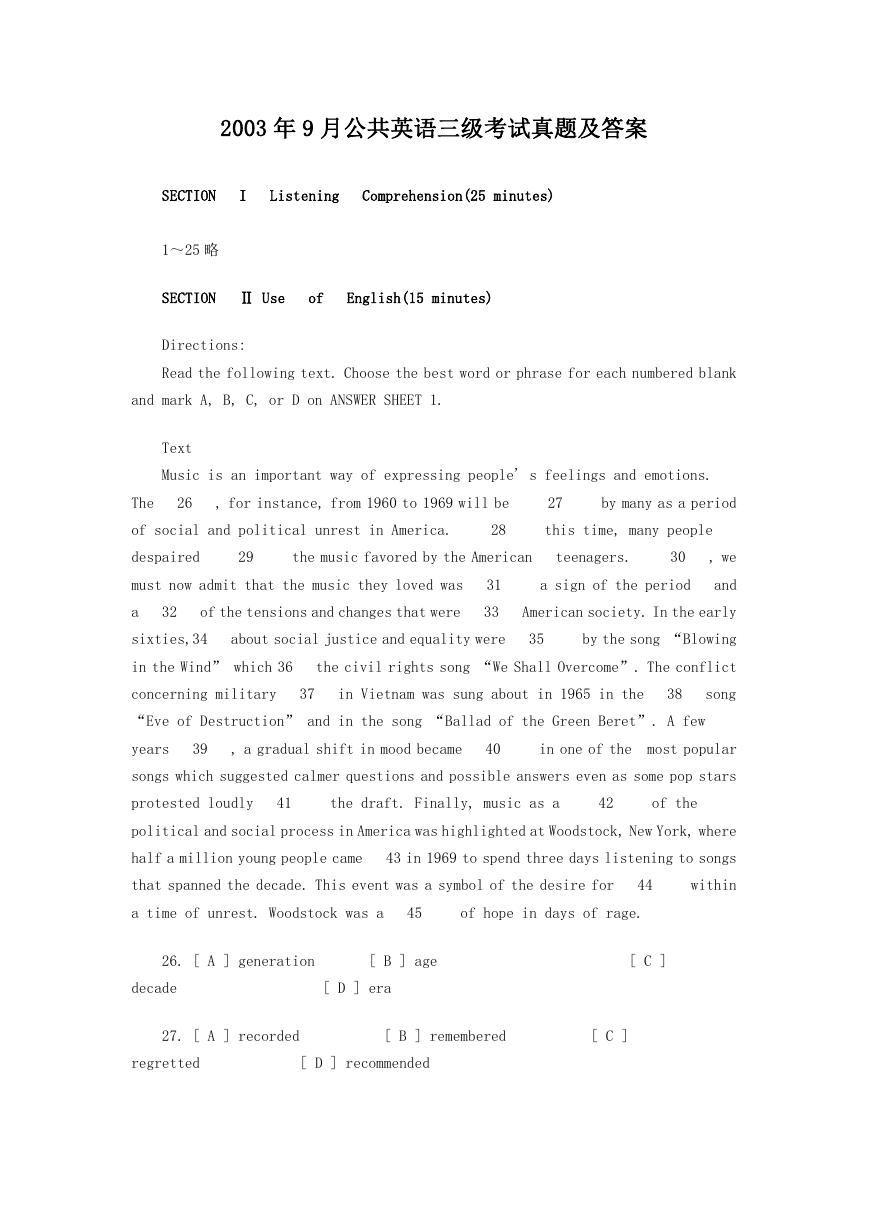

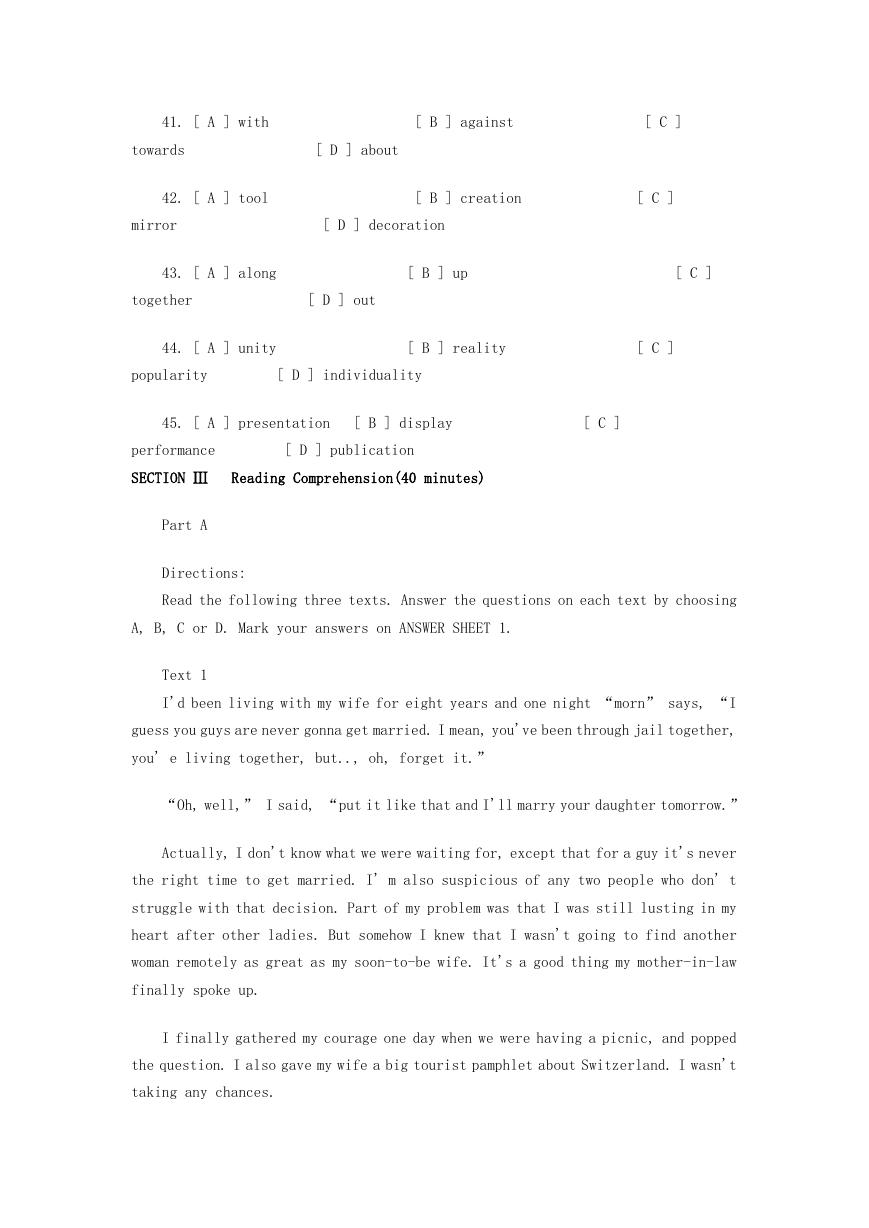
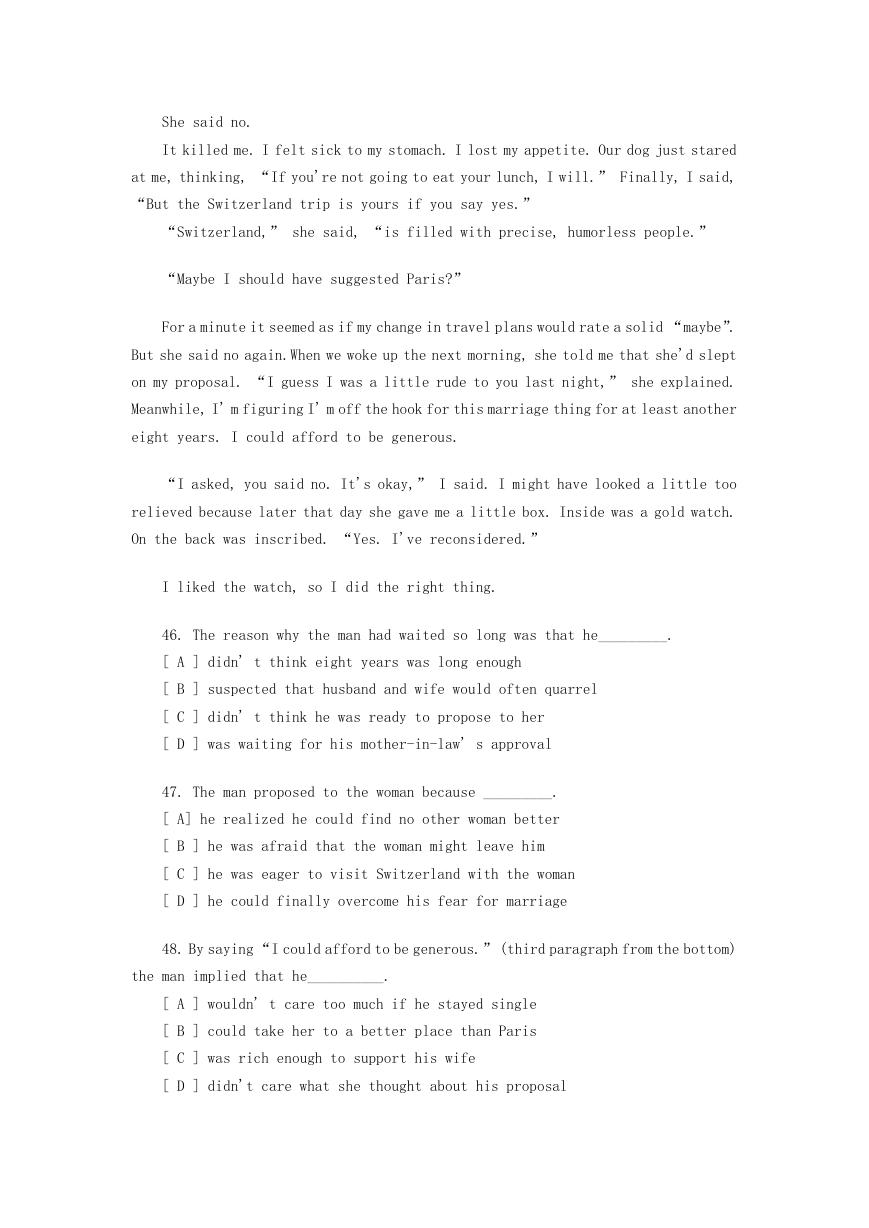
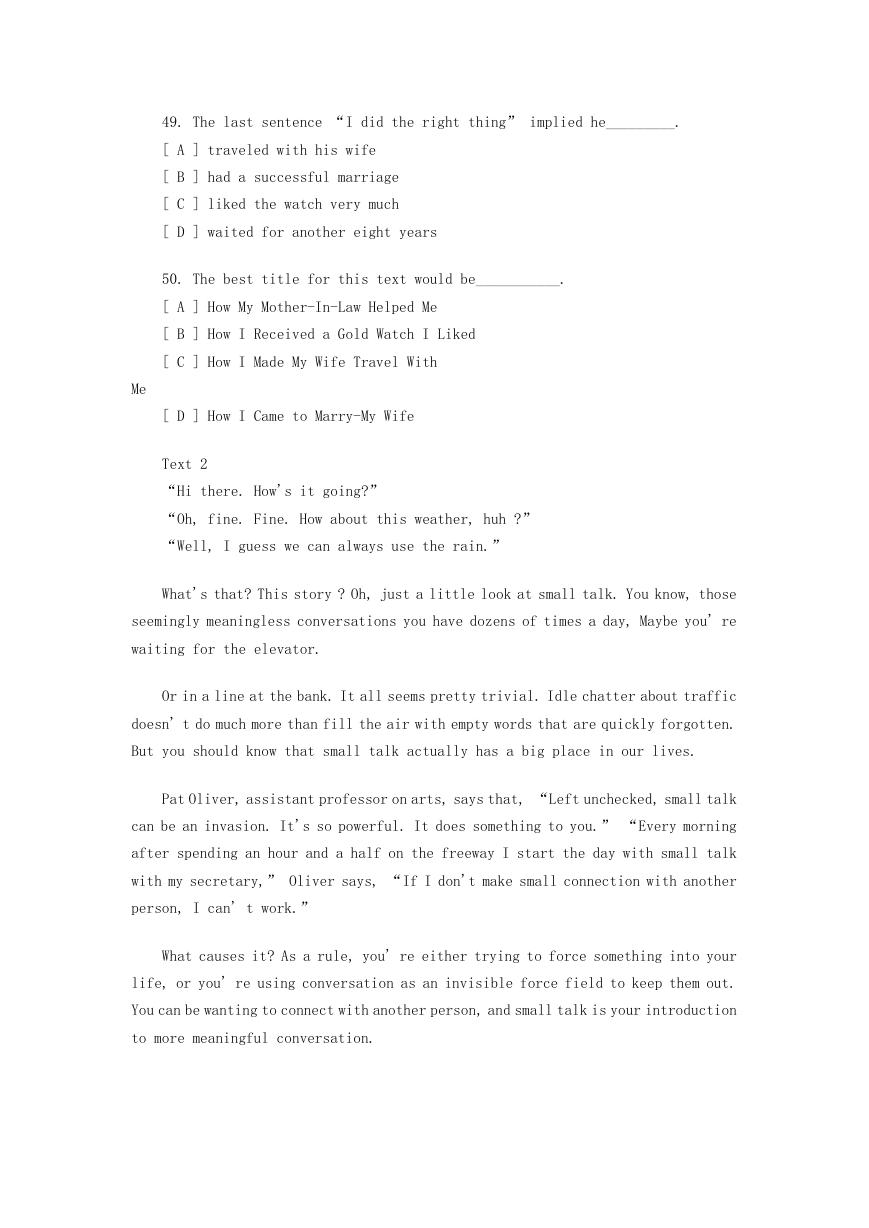

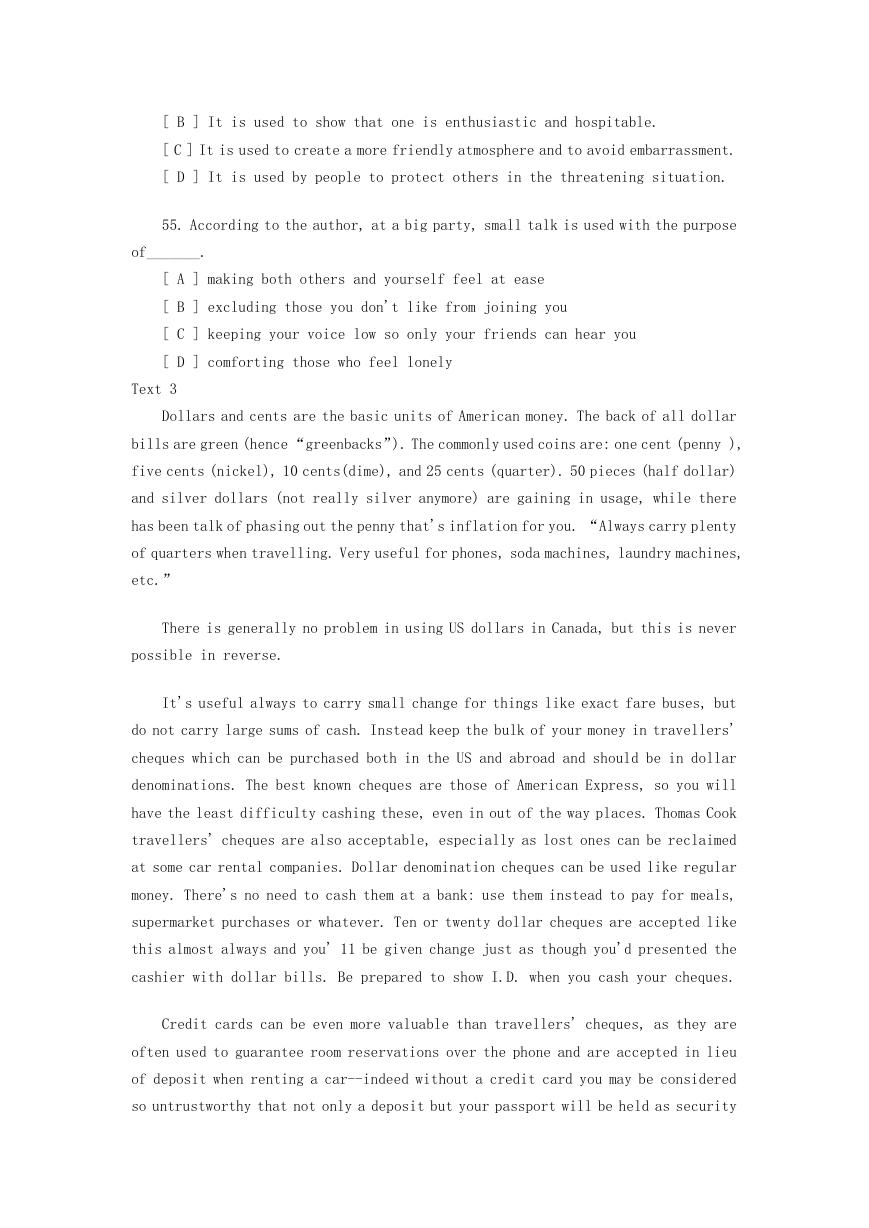
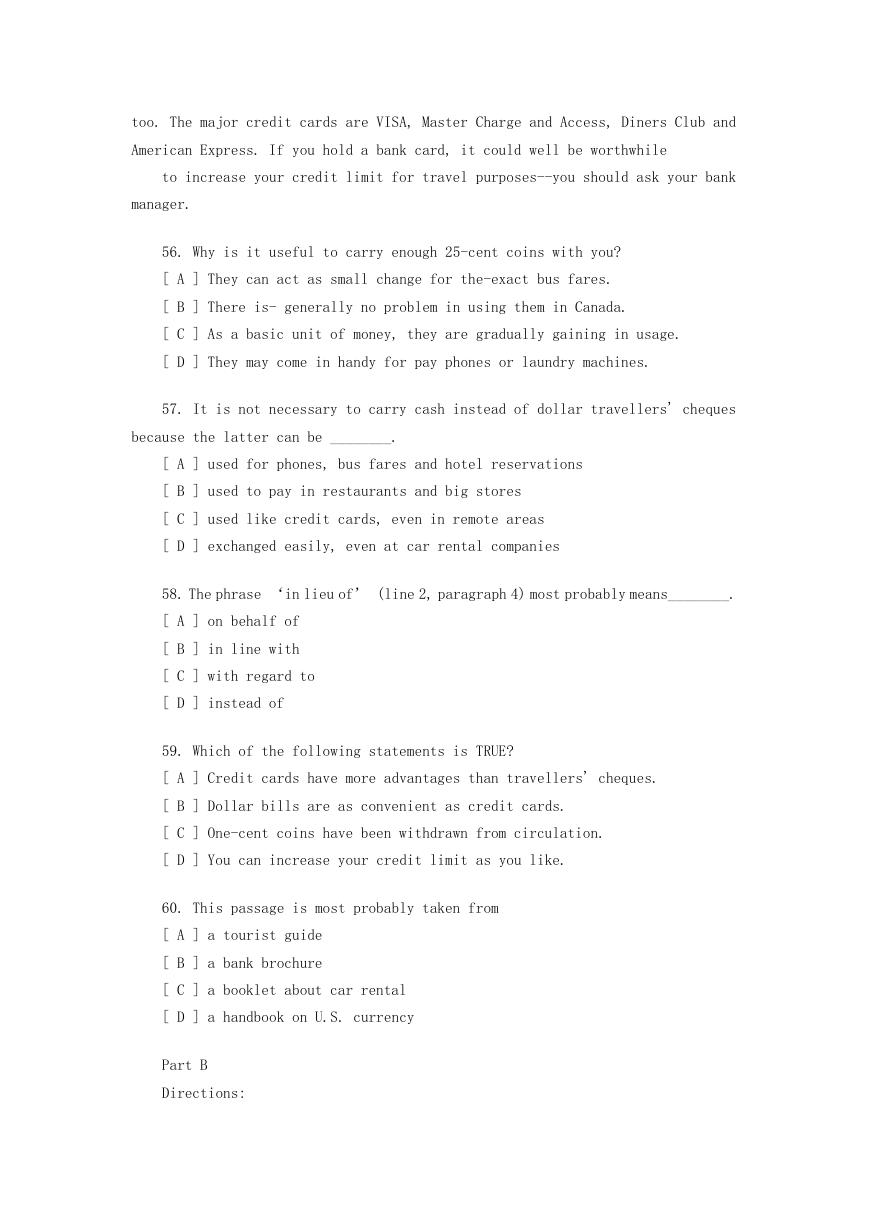








 2023年江西萍乡中考道德与法治真题及答案.doc
2023年江西萍乡中考道德与法治真题及答案.doc 2012年重庆南川中考生物真题及答案.doc
2012年重庆南川中考生物真题及答案.doc 2013年江西师范大学地理学综合及文艺理论基础考研真题.doc
2013年江西师范大学地理学综合及文艺理论基础考研真题.doc 2020年四川甘孜小升初语文真题及答案I卷.doc
2020年四川甘孜小升初语文真题及答案I卷.doc 2020年注册岩土工程师专业基础考试真题及答案.doc
2020年注册岩土工程师专业基础考试真题及答案.doc 2023-2024学年福建省厦门市九年级上学期数学月考试题及答案.doc
2023-2024学年福建省厦门市九年级上学期数学月考试题及答案.doc 2021-2022学年辽宁省沈阳市大东区九年级上学期语文期末试题及答案.doc
2021-2022学年辽宁省沈阳市大东区九年级上学期语文期末试题及答案.doc 2022-2023学年北京东城区初三第一学期物理期末试卷及答案.doc
2022-2023学年北京东城区初三第一学期物理期末试卷及答案.doc 2018上半年江西教师资格初中地理学科知识与教学能力真题及答案.doc
2018上半年江西教师资格初中地理学科知识与教学能力真题及答案.doc 2012年河北国家公务员申论考试真题及答案-省级.doc
2012年河北国家公务员申论考试真题及答案-省级.doc 2020-2021学年江苏省扬州市江都区邵樊片九年级上学期数学第一次质量检测试题及答案.doc
2020-2021学年江苏省扬州市江都区邵樊片九年级上学期数学第一次质量检测试题及答案.doc 2022下半年黑龙江教师资格证中学综合素质真题及答案.doc
2022下半年黑龙江教师资格证中学综合素质真题及答案.doc